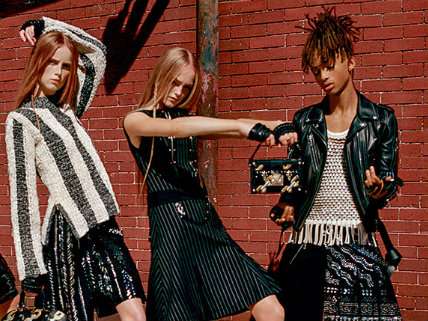Gen Z Doesn't Really Believe in Gender
Fifty-six percent know someone who uses gender-neutral pronouns and only 44 percent always wear clothes designed for their gender.


Here's an interesting look at the post-millennial cohort that people are currently calling "Gen Z." Though its parameters are still nebulous, Gen Z starts somewhere between 1995 and 2000 and ends somewhere between now and 2025. It's a rough concept still…kind of like these kids' budding views on gender and sexuality. But if one thing's clear from a new Innovation Group survey, the oldest of Gen Z—today's 13- to 20-year-olds—are, as Broadly puts it, queer as fuck.
A few quick hits: 35 percent of Gen Z respondents consider themselves somewhat bisexual, with only 48 percent identifying as completely straight and six percent exclusively into same-sex partners. Fifty-six percent said they know someone who goes by gender-neutral pronouns such as "they," "xi," or "ze." And only 44 percent said they always wore clothes designed for their gender.
The Innovation Group presented these results at the SXSW festival in Austin last Friday. The study of around 1,000 young people also included millennials, defined here as those between ages 21 and 34. Compared to Gen Z, millennials identify as less fluid in their sexuality and are less likely to use gender-neutral products or know people who use gender-neutral pronouns.
A full 65 percent of millennials identified as completely heterosexual, and millennials were less likely than Gen Z respondents to buy non-gendered shoes, clothes, deodorant, fragrances, or sports equipment. Neither group was big on saying that people are defined by gender, but Gen Z respondents were more likely to say that "gender doesn't define a person as much as it used to" (38 percent of Gen Z strongly agreed, versus 27 percent of millennials).
Of course, there are explanations here other than millennials simply being less woke. Adolescence is a time of sexual exploration, and some of these sexually fluid teens may later come to identify more concretely as heterosexual or homosexual, as is wont to happen. As for gender not defining a person as much as it used to, millennials may not wish this so any less but simply have more experience in the broader world and are therefore less optimistic about gender not defining people. Regardless, when you combine those who "strongly agree" with those who only "somewhat agree" that gender doesn't define people, the difference between Gen Z and millennials drops to just four percentage points.
For some survey questions, pollsters divided data into three groups: Gen Z, younger millennials (21 to 27 years old) and older millennials (28 to 34 years old). Some results:
- 56 percent of Gen Z respondents, 47 percent of younger millennials, and 43 percent of older millennials know someone who uses gender-neutral pronouns.
- 70 percent of Gen Z, 58 percent of younger millennials, and 56 percent of older millennials agree that "it's important for public spaces to provide access to gender neutral bathrooms."
- 74 percent of Gen Z, 65 percent of younger millennials, and 62 percent of older millennials say they are more accepting of "nontraditional gender identities" than they were a year ago.
- 88 percent of Gen Z, 81 percent of younger millennials, and 83 percent of older millennials agree that "if a sport is available for one gender at a school or university it should be available to the other gender as well."
Another section simply asked if respondents were familiar with terms like "cisgender" and "asexual." On most of the words asked about, knowledge gaps between age groups were not drastic, and each group led in identificaiton of some words. Older millennials were more familiar than Gen Z or younger millennials with the words transgender, queer, and asexual. Younger respondents were significantly more familiar with terms like demisexual, genderqueer, and pansexual. The most familiar of the terms overall were transgender, queer, and asexual.
Across age groups, overall knowledge of most of the terms was pretty low. Just 33 percent of Gen Z respondents, 29 percent of younger millennials, and 19 percent of older millennials had heard the term genderqueer. Less than half of Gen Z and older millennials and slightly more than half of younger millenials had heard the term gender fluid. And just 28 percent of Gen Z, 23 percent of younger millennials, and 19 percent of older millenials knew the term cisgender, with similar percentages for nonbinary.

Show Comments (96)